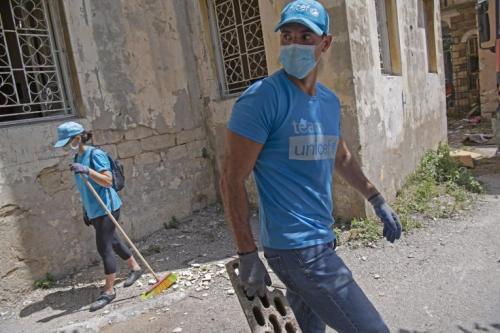UNICEF appeals for $46.7 million dollars to reach 100,000 children affected by Beirut explosions over the next three months
Geneva Palais briefing note on latest situation for children affected by Beirut explosions and UNICEF response
UNICEF announced an updated appeal to support children affected by the Beirut explosions on August 14, 2020.

On 8 August 2020 in Beirut, Lebanon, UNICEF personnel and partners join efforts with local residents to clean up the streets in the areas most devastated by the massive explosion that took place on 4 August.
“The Beirut explosions have created additional trauma for the children of Lebanon who also have to cope with the impact of a steep economic crisis and a raging pandemic," said UNICEF Executive Director Henrietta Fore. "UNICEF and partners have been on the ground from day one, salvaging vaccine stockpiles, distributing water, and helping clean up debris. We count on our donors to help us support the children and families who are affected by this tragedy and who will need all the support they can get to rebuild their lives.”
The updated appeal was announced in Geneva, where UNICEF Lebanon Deputy Representative Violet Speek-Warnery – to whom quoted text below may be attributed – briefed journalists at the press briefing at the Palais des Nations.
"It has been nearly 10 days since the devastating explosions at Beirut’s port. The destruction, as you’ve all seen, is hard to fathom. And it happened in a context of an already collapsed economy, political instability and a surge in COVID-19 cases. From the outset, UNICEF has been with the Lebanese people, working to protect children and the health, water and education facilities that keep them safe.
"UNICEF’s revised appeal to reach 100,000 children with support and assistance over the next three months is $46.7 million dollars. It includes three major pillars.
"First: Keeping children safe.
•This includes mental health and psychosocial support to help children and their families recover from trauma. This comes in the form of psychosocial kits for children and parents; to setting up child-friendly spaces in affected areas; to the provision of more specialized, intensive support.
•This includes services to protect children from gender-based violence and the provision of hygiene supplies such as sanitary pads.
•And this includes a one-off emergency cash grant to make sure that the most economically vulnerable families can meet their children’s basic needs.
"Second: Rehabilitating the basic essential services that keep children safe.
•Many homes still don’t have access to safe, sufficient water for drinking, cooking and personal hygiene, so the response includes repairing damaged water and sanitation facilities and systems.
•The appeal covers the rehabilitation of 16 damaged primary health care centres that serve 160,000 people and equipping them with critically needed supplies, including much-needed personal protective equipment for health and frontline workers who are simultaneously responding to the COVID-19 pandemic.
•And, crucially for children, rehabilitating damaged schools and making sure that children whose homes have been damaged can keep learning – whether in classrooms or via COVID-enforced distance learning.
"Finally: with resources and tools provided by UNICEF, the work done so far by young volunteers, to clean debris, deliver food and water, even sew face masks – has been perhaps the most inspiring and hopeful aspect of the response thus far. The revised appeal will provide training and resources to equip thousands more adolescents with the skills they need – whether it is carpentry, or plumbing or construction – to be part of the effort to rebuild their country.
"The longer-term consequences of the explosions on children are yet to be fully grasped, and the fall out will be felt for months and possibly even years to come. Assessments are already underway for what a longer sustained response to Lebanon will look like – one that holistically responds to the multiple challenges the country faces – a huge refugee population; the socio-economic-political crisis; COVID-19; and the destruction wrought by the explosion. Lebanon’s children need our sustained attention and support. They deserve nothing less."
Source:United Nations Children's Fund
- 180 reads
Human Rights
Ringing FOWPAL’s Peace Bell for the World:Nobel Peace Prize Laureates’ Visions and Actions

Protecting the World’s Cultural Diversity for a Sustainable Future

The Peace Bell Resonates at the 27th Eurasian Economic Summit

Declaration of World Day of the Power of Hope Endorsed by People in 158 Nations

Puppet Show I International Friendship Day 2020

